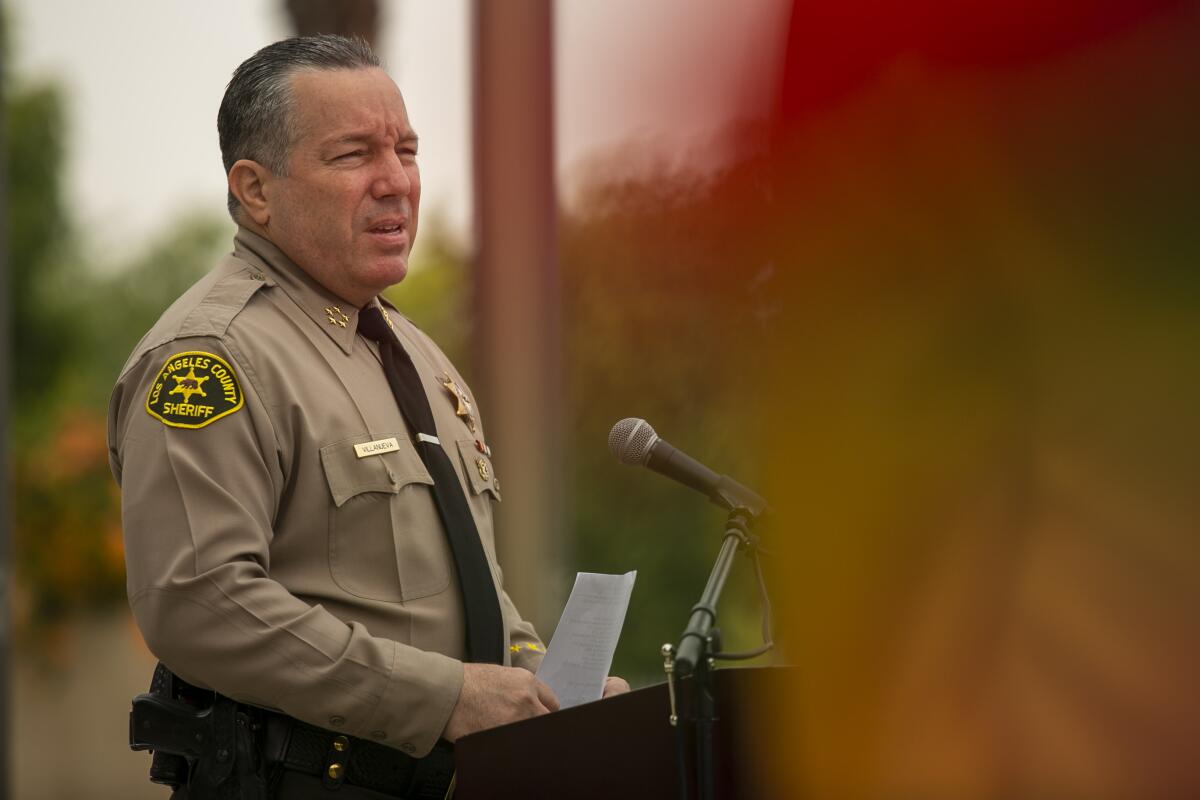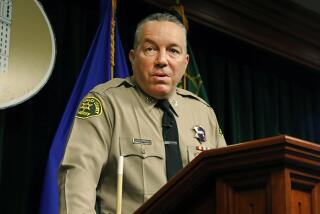Column: Sheriff Villanueva discusses his public power struggles, homelessness and more

- Share via
It turned out that Los Angeles County Sheriff Alex Villanueva wanted to talk about a whole lot more than homelessness.
We were about an hour into our 90-minute conversation last week, and (as I wrote about in my Sunday column) he’d talked about encampments and lawlessness, his disdain for many of his fellow public officials, his contempt for the Los Angeles Times, the unintended consequences of Prop. 47, the “woke left,” his feelings about mask mandates (bad) and vaccinations (good), the debate over sheriff “gangs” versus “cliques,” and his plan to issue more permits to carry a concealed weapon.
“I rarely get the undivided attention of L.A. Times reporters,” he said, “so I hope I am not bombarding you.”
Hardly. While the starting point for our conversation was his decision to deploy his homelessness outreach team along the Venice boardwalk, I was glad he was covering so many topics, and I had a lot of questions for him. But first, Villanueva had more to say about The Times.
As it turns out, our sheriff has a long memory for slights — he mentioned a 1999 Times editorial cartoon that depicted a Latino official in Aztec dress, for which the paper apologized — and he believes this paper has been harder on him than on his white predecessor because he is Latino.
“The rub on your organization is that it’s very anti-Latino,” he said.
That was certainly true once, but today’s Times is demonstrably more inclusive, and we’re determined to keep making progress. Villanueva is the subject of negative coverage because, unlike any sheriff in recent memory, he is engaged in nonstop public power struggles on many fronts.
In fact, the Board of Supervisors sued him shortly after he took office because he reinstated Caren Carl Mandoyan, the deputy who was fired by the previous sheriff after being accused of stalking and attacking his ex-girlfriend, also a deputy, and lying to internal affairs investigators.
“You realize the board hired a law firm to sue me one month into office?” he said. “Why on Earth would you sue a brand-new sheriff?... That is so wildly unethical and irresponsible.”
Villanueva then called into question the veracity of the victim, who had provided investigators video and audio of Mandoyan breaking into her home.
“Then we find out … that was the third person she accused of assaulting her, not the first.”
“Maybe three people assaulted her,” I replied tersely, rankled by what I considered a sexist line of attack.
“Possibly,” he conceded, “but she was not credible.”
That legal saga continues to this day — at taxpayer expense. Mandoyan has sued the county for wrongful termination; Villanueva has appealed a court decision that upheld the deputy’s firing.
Villanueva told me he believes Mandoyan will eventually be reinstated. After immersing myself in the case documents, I really hope not.
Moving on, there was something else I wanted to know: why our sheriff created a unit to make it easier for private individuals to obtain permits to carry concealed weapons, a move that strikes me as really out of touch with our politically progressive county.
“You gotta pay attention to what liberal Democrats are doing,” he told me. “Right now, they are buying guns.”
It is true that gun purchases in Los Angeles, as well as around the country, have spiked dramatically since the beginning of the pandemic, and many buyers are first-time owners.
Violent crime is up, and it does appear that the increase in sales is not tied to fears of tighter gun controls, which drives conservatives to buy guns, but of societal instability and national anxiety over the pandemic, right-wing militias, civil unrest and economic uncertainty.
But does making it easier for people to walk around with hidden loaded weapons really make sense?
“When you’re reducing the consequences for involvement in violent crime, it just ups the stakes for everybody,” Villanueva said. “If I have a DA who is not going to file gang enhancements, gun enhancements, multiple victim enhancements, [he is] just making the streets more dangerous for everybody. Remember, we are in the middle of being defunded. I don’t have the resources to flood the streets with deputies.”
Right now, he said, only 1,200 people in populous Los Angeles County have concealed carry permits, compared with 10,000 in the counties that surround us.
That’s because most of those jurisdictions issue permits if applicants meet a list of criteria; in Los Angeles, even if they meet the criteria (training, background checks, etc.) permits are issued at the discretion of the sheriff.
“All I am asking for is a legitimate good cause,” he said. “Something that is beyond just ‘I live in L.A. and I’m scared.’”
What would count as a good cause?
Someone who works in a business that puts them “in harm’s way,” he said. A restaurant employee who makes cash deposits at night, or a “female realtor who sells houses far in the boonies somewhere — that would be prime.”
And, yes, he said, even someone in the legal cannabis business might qualify.
We circled back to homelessness.
One reason he’s running for reelection, he said, is that “I want to get a finality to our homeless crisis. Make it manageable. We can actually contain the problem. We can establish the safe campgrounds, the safe parking areas for the RVs and funnel everyone into these locations, where then they can start working on triaging the people that’ll never have a job, the ones that need treatment for substance abuse, and the ones that just need to leave L.A. County.”
So why not take on the county’s most shameful homeless encampment, the one just a few blocks from his office?
“We will get to Skid Row, but we have to resolve the equation first and work our way inwards,” he replied. “That’s my last destination.
“And remember,” he added, “we are not criminalizing poverty, but we will definitely hold people accountable for not upholding the rule of law.”
The civil libertarian in me wanted to scream, but I decided to let the sheriff have the last word for now.
“We could actually take them to jail, clean them up, straighten them out and then take them to a halfway house once we stabilize them,” he said. “It’s probably one of the things we might strive for in the next year. And we might save some lives along the way.”
@AbcarianLAT
More to Read
A cure for the common opinion
Get thought-provoking perspectives with our weekly newsletter.
You may occasionally receive promotional content from the Los Angeles Times.










